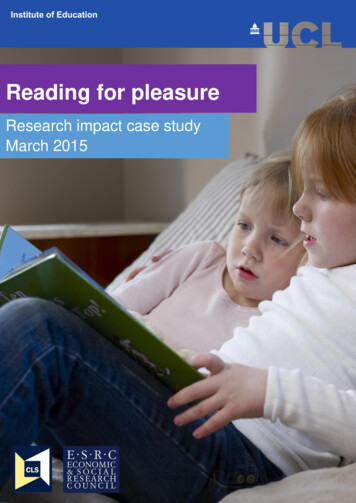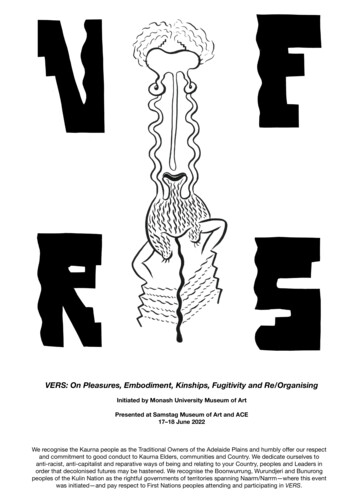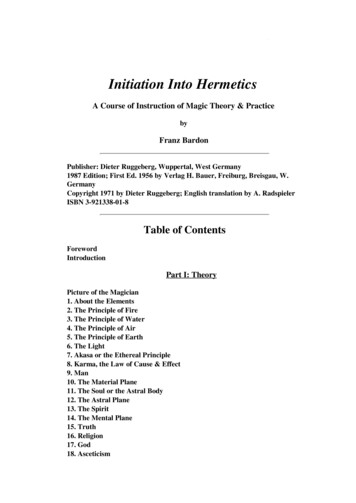
Transcription
Beyond the Pleasure PrincipleWhile Freud did not explicitly make this claim, one may regard Beyond thePleasure Principle (1920) as the first, still somewhat tentative resolution ofthe troubling theoretical problem he had raised in the paper on narcissism(see above, pp. 545-62). The Ego and the Id, published three years later,was his second, definitive response. He now replaced the pairing of driveslibidinal and egoistic-that had served him for more than a decade ofpsychoanalvtic theorizing and that he had called into question not longbefore the World War, with a new, more dramatic pair of contestants: lifeagainst death. Aggression, to which Freud had earlier devoted a measure ofattention that he now deemed inadequate, became from 1920 on the equaladversary of Eros.As critics have not failed to note, Beyond the Pleasure Principle is moreremote from Freud's clinical experience than earlier theoretical papers.Freud does adduce some "case material," including veterans suffering fromwar neuroses, and that famous "fort-da" game that his eighteen-month-oldgrandson, Ernst Halberstadt-his daughter Sophie's eldest-played wbile hisobservant grandfather was watching. But for the rest, as Freud frankly noted,there is a good deal of conjecture in this little, path-breaking book: "Whatfollows," Freud writes after giving his concrete instances of the "compulsionto repeat," is "speculation, often far-fetched speculation." But he thoughtsuch speculation unavoidable in the uncharted terrain he was now entering.(In the selections that follow, much of this material, especially about speculative biology, has been omitted.) The essay is a difficult text, but as the firststatement of the new "structural" theory of the mind, it is indispensable to anunderstanding of fundamental shifts in psychoanalytic thinking.Freud's preoccupation with death, marked in Beyond the Pleasure Principleand much of his later writing, has invited the suggestion that his thinking wascolored darkly by the death of his charming and attractive daughter Sophie inJanuary 1920, during the great influenza epidemic that claimed so many victims across Europe and the United States. Indeed, Fritz Wittels, an earlyassociate of the Vienna psychoanalytic circle, said so explicitly in his biography of Freud (the first), of which he sent an advance copy to his subject inlate 1923. Freud acknowledged that Wittels's argument was plausibleenough. But he vigorously denied that he had developed his theory of thedeath drive as a consequence of grieving for his Sophie: the chronology wasagainst it. He had in fact virtually completed Beyond the Pleasure Principle in1919, and circulated the manuscript among a few intimates, while Sophiewas still flourishing and enjoying perfect health. The essay must be read notas an exercise in autobiography, but as a turning point in theory.In the theory of psycho-analysis we have no hesitation in assuming thatthe course taken by mental events is automatically regulated by thepleasure principle. We believe, that is to say, that the course of those
BEYOND THE PLEASURE PRINCIPLE595events is invariably set in motion by an unpleasurable tension, and thatit takes a direction such that its final outcome coincides with a loweringof that tension-that is, with an avoidance of unpleasure or a productionof pleasure. In taking that course into account in our consideration ofthe mental processes which are the subject of our study, we are introducing an 'economic' point of view into our work; and if, in describingthose processes, we try to estimate this 'economic' factor in addition tothe 'topographical' and 'dynamic' ones, we shall, I think, be giving themost complete description of them of which we can at present conceive,and one which deserves to be distinguished by the term 'metapsychological' .It is of no concern to us in this connection to enquire how far, withthis hypothesis of the pleasure principle, we have approached or adoptedany particular, historically established, philosophical system. We havearrived at these speculative assumptions in an attempt to describe andto account for the facts of daily observation in our field of study. Priorityand originality are not among the aims that psycho-analytic work setsitself; and the impressions that underlie the hypothesis of the pleasureprinciple are so obvious that they can scarcely be overlooked. On theother hand we would readily express our gratitude to any philosophicalor psychological theory which was able to inform us of the meaning ofthe feelings of pleasure and unpleasure which act so imperatively uponus. But on this point we are, alas, offered nothing to our purpose. Thisis the most obscure and inaccessible region of the mind, and, since wecannot avoid contact with it, the least rigid hypothesis, it seems to me,will be the best. We have decided to relate pleasure and unpleasure tothe quantity of excitation that is present in the mind but is not in anyway 'bound'; and to relate them in such a manner that unpleasurecorresponds to an increase in the quantity of excitation and pleasure toa diminution. What we are implying by this is not a simple relationbetween the strength of the feelings of pleasure and unpleasure and thecorresponding modifications in the quantity of excitation; least of allin view of all we have been taught by psycho-physiology-are we suggesting any directly proportional ratio: the factor that determines thefeeling is probably the amount of increase or diminution in the quantityof excitation in a given period of time. Experiment might possibly playa part here; but it is not advisable for us analysts to go into the problemfurther so long as our way is not pointed by quite definite observations.* * *The facts which have caused us to believe in the dominance of thepleasure principle in mental life also find expression in the hypothesisthat the mental apparatus endeavours to keep the quantity of excitationpresent in it as low as possible or at least to keep it constant. This latterhypothesis is only another way of stating the pleasure principle; for ifthe work of the mental apparatus is directed towards keeping the quantity
596TRANSITIONS AND REVISIONSof excitation low, then anything that is calculated to increase that quantity is bound to be felt as adverse to the functioning of the apparatus,that is as unpleasurable. The pleasure principle follows from the principleof constancy: actually the latter principle was inferred from the factswhich forced us to adopt the pleasure principle. * * *It must be pointed out, however, that strictly speaking it is incorrectto talk of the dominance of the pleasure principle over the course ofmental processes. If such a dominance existed, the immense majorityof our mental processes would have to be accompanied by pleasure orto lead to pleasure, whereas universal experience completely contradictsany such conclusion. The most that can be said, therefore, is that thereexists in the mind a strong tendency towards the pleasure principle, butthat that tendency is opposed by certain other forces or circumstances,so that the final outcome cannot always be in harmony with the tendencytowards pleasure. * * *If we turn now to the question of what circumstances are able toprevent the pleasure principle from being carried into effect, we findourselves once more on secure and well-trodden ground and, in framingour answer, we have at our disposal a rich fund of analytic experience.The first example of the pleasure principle being inhibited in this wayis a familiar one which occurs with regularity. We know that the pleasureprinciple is proper to a primary method of working on the part of themental apparatus, but that, from the point of view of the self-preservationof the organism among the difficulties of the external world, it is fromthe very outset inefficient and even highly dangerous. Under the influence of the ego's instincts of self-preservation, the pleasure principle isreplaced by the reality principle. This latter principle does not abandonthe intention of ultimately obtaining pleasure, but it nevertheless demands and carries into effect the postponement of satisfaction, the abandonment of a number of possibilities of gaining satisfaction and thetemporary toleration of unpleasure as a step on the long indirect roadto pleasure. The pleasure principle long persists, however, as the methodof working employed by the sexual instincts, which are so hard to 'educate', and, starting from those instincts, or in the ego itself, it oftensucceeds in overcoming the reality principle, to the detriment of theorganism as a whole.There can be no doubt, however, that the replacement of the pleasureprinciple by the reality principle can only be made responsible for asmall number, and by no means the most intense, of unpleasure experiences. Another occasion of the release of unpleasure, which occurswith no less regularity, is to be found in the conflicts and dissensionsthat take place in the mental apparatus while the ego is passing throughits development into more highly composite organizations. Almost allthe energy with which the apparatus is filled arises from its innate instinctual impulses. But these are not all allowed to reach the same phasesof development. In the course of things it happens again and again that
BEYOND THE PLEASURE PRINCIPLE597individual instincts or parts of instincts turn out to be incompatible intheir aims or demands with the remaining ones, which are able tocombine into the inclusive unity of the ego. The former are then splitoff from this unity by the process of repression, held back at lower levelsof psychical development and cut off, to begin with, from the possibilityof satisfaction. If they succeed subsequently, as can so easily happenwith repressed sexual instincts, in struggling through, by roundaboutpaths, to a dired or to a substitutive satisfaction, that event, which wouldin other cases have been an opportunity for pleasure, is felt by the egoas unpleasure. As a consequence of the old conflict which ended inrepression, a new breach has occurred in the pleasure principle at thevery time when certain instincts were endeavouring, in accordance withthe principle, to obtain fresh pleasure. * * *The two sources of unpleasure which I have just indicated are veryfar from covering the majority of our unpleasurable experiences. But asregards the remainder it can be asserted with some show of justificationthat their presence does not contradict the dominance of the pleasureprinciple. Most of the unpleasure that we experience is perceptual unpleasure. It may be perception of pressure by unsatisfied instincts; or itmay be external perception which is either distressing in itself or whichexcites unpleasurable expectations in the mental apparatus--that is,which is recognized by it as a 'danger'. The reaction to these instinctualdemands and threats of danger, a reaction which constitutes the properactivity of the mental apparatus, can then be directed in a correct mannerby the pleasure principle or the reality principle by which the former ismodified. This does not seem to necessitate any far-reaching limitationof the pleasure principle. Nevertheless the investigation of the mentalreaction to external danger is precisely in a position to produce newmaterial and raise fresh questions bearing upon our present problem.IIA condition has long been known and described which occurs afterseveral mechanical concussions, railway disasters and other accidentsinvolving a risk to life; it has been given the name of 'traumatic neurosis'.The terrible war which has just ended gave rise to a great number ofillnesses of this kind, but it at least put an end to the temptation toattribute the cause of the disorder to organic lesions of the nervous systembrought about by mechanical force. 1 The symptomatic picture presentedby traumatic neurosis approaches that of hysteria in the wealth of itssimilar motor symptoms, but surpasses it as a rule in its strongly markedsigns of subjective ailment (in which it resembles hypochondria or melancholia) as well as in the evidence it gives of a far more comprehensivegeneral enfeeblement and disturbance of the mental capacities. No com1. Cf. the discussion on the psycho-analysis of war neuroses by Freud. Ferenczi. Abraham. Simmeland Jones {Psycho-Analysis and the War-Neuroses. [1919; tr. 1921]}.
598TRANSITIONS AND REVISIONSplete explanation has yet been reached either of war neuroses or of thetraumatic neuroses of peace. In the case of war neuroses, the fact thatthe same symptoms sometimes came about without the intervention ofany gross mechanical force seemed at once enlightening and bewildering. In the case of the ordinary traumatic neuroses, two characteristicsemerge prominently: first, that the chief weight in their causation seemsto rest upon the factor of surprise, of fright; and secondly, that a woundor injury inflicted simultaneously works as a rule against the development of a neurosis. 'Fright', 'fear', and 'anxiety' are improperly used assynonymous expressions; they are in fact capable of clear distinction intheir relation to danger. 'Anxiety' describes a particular state of expectingthe danger or preparing for it, even though it may be an unknown one.'Fear' requires a definite object of which to be afraid. 'Fright', however,is the name we give to the state a person gets into when he has run intodanger without being prepared for it; it emphasizes the factor of surprise.I do not believe anxiety can produce a traumatic neurosis. There issomething about anxiety that protects its subject against fright and soagainst fright-neuroses. We shall retum to this point later.The study of dreams may be considered the most trustworthy methodof investigating deep mental processes. Now dreams occurring in traumatic neuroses have the characteristic of repeatedly bringing the patient back into the situation of his accident, a situation from which hewakes up in another fright. This astonishes people far too little. Theythink the fact that the traumatic experience is constantly forcing itselfupon the patient even in his sleep is a proof of the strength of thatexperience: the patient is, as one might say, fixated to his trauma.Fixations to the experience which started the illness have long beenfamiliar to us in hysteria. Breuer and Freud declared in 1893 that'hysterics suffer mainly from reminiscences'. In the war neuroses, too,observers like Ferenczi and Simmel have been able to explain certainmotor symptoms by fixation to the moment at which the traumaoccurred.I am not aware, however, that patients suffering from traumatic neurosis are much occupied in their waking lives with memories of theiraccident. Perhaps they are more concerned with not thinking of it.Anyone who accepts it as something self-evident that their dreams shouldput them back at night into the situation that caused them to fall ill hasmisunderstood the nature of dreams. It would be more in harmony withtheir nature if they showed the patient pictures from his healthy past orof the cure for which he hopes. If we are not to be shaken in our beliefin the wish-fulfilling tenor of dreams by the dreams of traumatic neurotics, we still have one resource open to us: we may argue that thefunction of dreaming, like so much else, is upset in this condition anddiverted from its purposes, or we may be driven to reflect on the mysterious masochistic trends of the ego.**
BEYOND THE PLEASURE PRINCIPLE599At this point I propose to leave the dark and dismal subject of thetraumatic neurosis and pass on to examine the method of working employed by the mental apparatus in one of its earliest nonnal activities-I mean in children's play.* * * I have been able, through a chance opportunity which presented itself, to throw some light upon the first game played by a littleboy of one and a half and invented by himself. It was more than a merefleeting observation, for I lived under the same roof as the child and hisparents for some weeks, and it was some time before I discovered themeaning of the puzzling activity which he constantly repeated.The child was not at all precocious in his intellectual development.At the age of one and a half he could say only a few comprehensiblewords; he could also make use of a number of sounds which expresseda meaning intelligible to those around him. He was, however, on goodterms with his parents and their one servant-girl, and tributes were paidto his being a 'good boy'. He did not disturb his parents at night, heconscientiously obeyed orders not to touch certain things or go intocertain rooms, and above all he never cried when his mother left himfor a few hours. At the same time, he was greatly attached to his mother,who had not only fed him herself but had also looked after him withoutany outside help. This good little boy, however, had an occasionaldishirbing habit of taking any small objects he could get hold of andthrowing them away from him into a corner, under the bed, and so on,so that hunting for his toys and picking them up was often quite a business. As he did this he gave vent to a loud, long-drawn-out '0-0-0-0',accompanied by an expression of interest and satisfaction. His motherand the writer of the present account were agreed in thinking that thiswas not a mere interjection but represented the German word 'fort'['gone']. I eventually realized that it was a game and that the only usehe made of any of his toys was to play 'gone' with them. One day Imade an observation which confirmed my view. The child had a woodenreel with a piece of string tied round it. It never occurred to him to pullit along the floor behind him, for instance, and play at its being acarriage. What he did was to hold the reel by the string and very skilfullythrow it over the edge of his curtained cot, so that it disappeared intoit, at the same time uttering his expressive '0-0-0-0'. He then pulled thereel out of the cot again by the string and hailed its reappearance witha joyful 'da' ['there']. This, then, was the complete game-disappearanceand return. As a rule one only witnessed its first act, which was repeateduntiringly as a game in itself, though there is no doubt that the greaterpleasure was attached to the second act. 22. A further observation subsequently confirmedthis interpretation fully. One day the child'smother had been away for several hours and onher return was met with the words 'Baby o- Hl-Ot'which was at first incomprehensible. It soon turnedout, however, that during this long period of sol-itude the child had found a method of makinghimulf disappear. He had discovered his rellectionin a full-length mirror which did not quite reachto the ground, so that by crouching down he couldmake his mirror-image 'gone'.
600TRANSITIONS AND REVISIONSThe interpretation of the game then became obvious It was relatedto the child's great cultural achievement-the instinctual renunciation(that is, the renunciation of instinctual satisfaction) which he had madein allowing his mother to go away without protesting. He compensatedhimself for this, as it were, by himself staging the disappearance andreturn of the objects within his reach. It is of course a matter of indifference from the point of view of judging the effective nature of thegame whether the child invented it himself or took it over on someoutside suggestion. Our interest is directed to another point. The childcannot possibly have felt his mother's departure as something agreeableor even indifferent. How then does his repetition of this distressingexperience as a game fit in with the pleasure principle? It may perhapsbe said in reply that her departure had to be enacted as a necessarypreliminary to her joyful return, and that it was in the latter that lay thetrue purpose of the game. But against this must be counted the observedfact that the first act, that of departure, was staged as a game in itselfand far more frequently than the episode in its entirety, with its pleasurable ending.No certain decision can be reached from the analysis of a single caselike this. On an unprejudiced view one gets an impression that the childturned his experience into a game from another motive. At the outsethe was in a passive situation-he was overpowered by the experience;but, by repeating it, unpleasurable though it was, as a game, he tookon an active part. These efforts might be put down to an instinct formastery that was acting independently of whether the memory was initself pleasurable or not. But still another interpretation may be attempted. Throwing away the object so that it was 'gone' might satisfyan impulse of the child's, which was suppressed in his actual life, torevenge himself on his mother for going away from him. In that caseit would have a defiant meaning: 'All right, then, go away! I don't needyou. I'm sending you away myself.' A year later, the same boy whomI had observed at his first game used to take a toy, if he was angry withit, and throw it on the floor, exclaiming: 'Go to the fwont!' He hadheard at that time that his absent father was 'at the front', and was farfrom regretting his absence; on the contrary he made it quite clear thathe had no desire to be disturbed in his sole possession of his mother. 3We know of other children who liked to express similar hostile impulsesby throwing away objects instead of persons. We are therefore left indoubt as to whether the impulse to work over in the mind some overpowering experience so as to make oneself master of it can find expressions as a primary event, and independently of the pleasure principle.For, in the case we have been discussing, the child may, after all, only3. When this child was five and three.quarters,his mother died. Now that she was really 'gone'(0-0-0), the little boy showed no signs of grief. Itis true that in the interval a second child had beenborn and had roused him to violent jealousy. {Thisdry comment is the only direct reAection of Sophie's death in the whole essay.}
BEYOND THE PLEAsuRE PRINCIPLE601have been able to repeat his unpleasant experience in play because therepetition carried along with it a yield of pleasure of another sort butnone the less a direct one.Nor shall we be helped in our hesitation between these two views byfurther considering children's play. It is clear that in their play childrenrepeat everything that has made a great impression on them in real life,and that in doing so they abreact the strength of the impression and, asone might put it, make themselves master of the situation. But on theother hand it is obvious that all their play is influenced by a wish thatdominates them the whole time-the wish to be grown-up and to beable to do what grown-up people do. It can also be observed that theunpleasurable nature of an experience does not always unsuit it for play.If the doctor looks down a child's throat or carries out some smalloperation on him, we may be quite sure that these frightening experiences will be the subject of the next game; but we must not in thatconnection overlook the fact that there is a yield of pleasure from anothersource. As the child passes over from the passivity of the experience tothe activity of the game, he hands on the disagreeable experience to oneof his playmates and in this way revenges himself on a substitute.Nevertheless, it emerges from this discussion that there is no need toassume the existence of a special imitative instinct in order to providea motive for play. Finally, a reminder may be added that the artisticplay and artistic imitation carried out by adults, which, unlike children's,are aimed at an audience, do not spare the spectators (for instance, intragedy) the most painful experiences and can yet be felt by them ashighly enjoyable. This is convincing proof that, even under the dominance of the pleasure principle, there are ways and means enough ofmaking what is in itself unpleasurable into a subject to be recollectedand worked over in the mind. The consideration of these cases andsituations, which have a yield of pleasure as their final outcome, shouldbe undertaken by some system of aesthetics with an economic approachto its sub
The pleasure principle long persists, however, as the method of working employed by the sexual instincts, which are so hard to 'ed-ucate', and, starting from those instincts, or in the ego itself, it often succeeds in overcoming the reality principle, to the detriment of the organism as a whole. There can be no doubt, however, that the .










